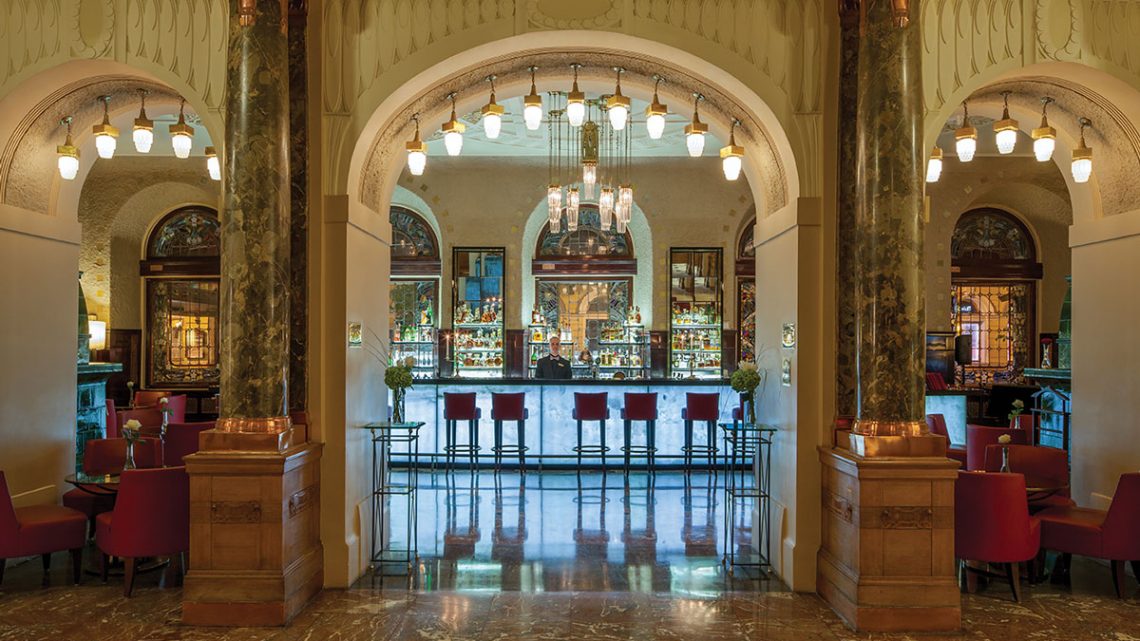If you are an aficionado of vodka and happen to be in St. Petersburg, Russia, then you should definitely head over to the Belmond Grand Hotel Europe. There you can arrange a special vodka tasting experience that is unlike any other.
Vodka is as much a coveted Russian cultural and commercial product as is caviar. During a trip to Russia for the Saint Petersburg Fashion Week, I resided at the Belmond. While there I made time to tour the spacious hotel and to meet with Alexander Dmitriev, the Belmond’s expert vodka sommelier. During my tasting, I learned that there are both traditionally made vodkas and “modern” ones that are produced differently thanks to technological advances.
As a lover of vodka, I have sampled over the years many local and famous brands during my travels to countries like Belarus, the Ukraine, Poland, etc. and that are proud of their own productions. However in Russia, I learned the rich history of their production.
Modern vs. Historical
When modern vodkas were invented, they were very expensive. They were a gift from the czar. Nicolas II decided to pair the vodka with caviar, thus bringing together for the first time these two very expensive luxuries. Prior to this, caviar was consumed with champagne. {FUN FACT: In Europe, the Romanov family members were the biggest consumers. And legend has it that when the champagne region was in financial ruins, only the consumption of the Romanoff family kept the afloat.}
It is at the beginning of the 20th Century where vodka production became less expensive. Vodkas produced through modern production methods and became more popular because they were far less expensive to make than the historical vodkas, which were produced through traditional means.
When the Soviets took over Russia in the early 20th Century, they recognized that modern vodkas could be a profitable business. So they decided to establish a monopoly. This caused the historically traditionally made vodkas to nearly disappear. It is only a bit more than 9 years ago that they returned to the Russian market. This was only made possible thanks to certain Russian families having safely guarded secret recipes until the day where they could be reintroduced.

iPhone photo of Belmond Grand Hotel Europe’s vodka choice
Beluga Vodka is a small production made in a rural area of Russia. It is an ecological region and is produced using waters from the melted snows of Siberia. Higher quality modern vodkas are very soft and do not burn on the palette. The after-taste is rather smooth.
In Russia it is a habit of infusing flavors into the vodka. Russians prefer to do their own version of it in variations that Westerners would consider to be a sort of “vodka sangria”. Here they put fruits in the vodka for about 3 days before serving it.
MODERN:
- Invented 140 years ago, modern vodka is very easy to find.
- The spirit is very clear.
- They reach 96 – 98% proof, and are then mixed with water (40 – 60%).
- They are the result of hi-tech production.
- They possess high level filtering and distillation.
- Due to their high level of distillation, their smells are nearly undetectable.
HISTORICAL:
- Before this time, there was there historical vodka named Polugar.
- Today, Polugar is the only traditional sold in Belmond Grand Hotel Europe.
- Made mostly from rye.
- Made sometimes from buckwheat, wheat, barely or a combination.
- Distillation is the same for whiskey.
- Traditional vodka is filtered egg and coal.
- They have a stronger taste, which lingers longer on the palette.
- Polugar’s can be costly and may reach prices of up about 140 euros /70cl.
INTERESTING LAST TIDBITS:
Russians have their little secrets to better appreciating their products. When it comes to traditional vodkas, they insist on putting a few drops in the palm of the hand and rubbing until evaporated. Upon smelling, one should be able to smell fresh baked bread! (I did it and it smelled like whole wheat bread).
According to the Belmond’s sommelier, Russians oftentimes make homemade vodka infusions that are kind of vodka sangria. He recommends his own special blend of strawberry and basil! He says that this can be done with any brand of vodka.








